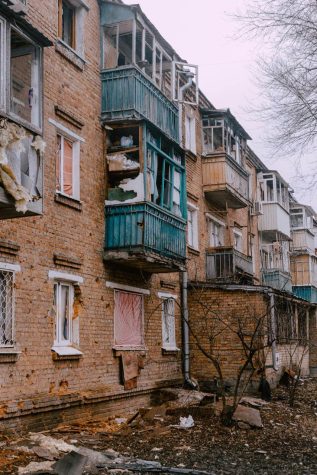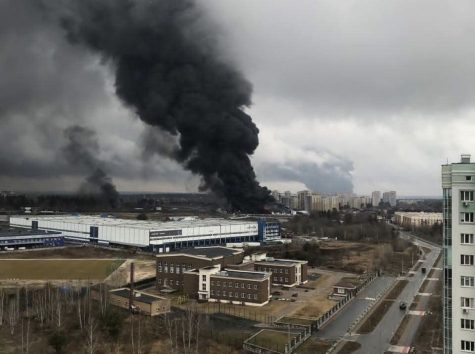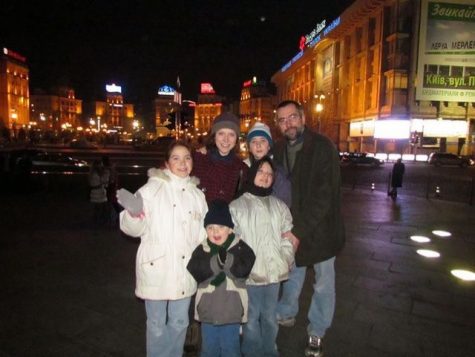‘A helpless feeling’: Ukrainian students speak out on war in homeland
March 17, 2022
In a poem she composed a few days after Russia invaded Ukraine, first-year student Abigail de Vuyst expressed a hope in written words:
“I hope that one day
My people can again smile
Without the constant fear and thought of war…Слава Україні (Slava Ukraini)!”
At least two million Ukrainians have been displaced as Russian artillery, air and rocket bombardment of Ukrainian cities cause a growing number of civilian deaths — now in the hundreds — while infrastructure and civilian buildings are destroyed. Like de Vuyst, those at Calvin who hail from Ukraine have seen these statistics not as numbers through TV screens but rather as friends and family; and they’re appealing for the rest of Calvin to do so, too.

De Vuyst, who grew up with her missionary parents in Mukachevo and Kyiv, said that her high school friends “woke up on Thursday morning to the sound of explosions.” To de Vuyst, the news came as a shock to reality. “It’s been surreal to me. This is my home: places I know and I’ve grown up in now showing up on TV,” de Vuyst said. Oleksandra Mykhnevych, who graduated with an M.Ed from Calvin in 2019 and currently studies at Trinity Evangelical Divinity School in Chicago, told Chimes that she and her family were completely surprised by the news of the war. Mykhnevych’s parents serve at a seminary in the city of Poltava, 93 miles to the west of Kharkiv. As soon as they heard the news, Mykhnevych and her father, both of whom are in the U.S., immediately called her mother to get her out to safety. “On the road she had to avoid strategic centers which were being targeted, and even so a rocket flew close to her on the highway,” Mykhnevych said.
For de Vuyst and Mykhnevych, the war has been seen and felt through the lives of friends and family on the ground. Mykhnevych said that two of her close friends had remained bunkered down for two weeks in a bomb shelter in Kharkiv, Ukraine’s second largest city, which sits only 24 miles away from the Russian border and has seen nightly Russian bombardment. “They told me that they stayed behind because someone had to rebuild the city after this,” Mykhnevych said. Mykhnevych also described besieged citizens banding together to help each other, cooking and delivering food to the children, elderly and sick, and getting resources to those who need them.

In her home city of Kyiv, de Vuyst described a general shortage of food that is threatening everyone with starvation. But there are more immediate, individual threats as well. De Vuyst said that a friend and coworker of her father, who is currently in hiding, has been targeted as part of Russia’s hit list. Russian agents showed up at his apartment with his photo.
“It’s hard to focus on schoolwork. I also feel guilty not putting all my focus and attention on helping people in Ukraine and focusing on the situation. I feel mentally exhausted. How do you deal with that?” de Vuyst said.
For junior nursing student Anne Bukovietski, who comes from Cherkasky, Ukraine, “being so far away brings a helpless feeling … It just makes everything feel so petty, and doing everyday things and going to lectures feel almost wrong.”

Each of these students also warned against disinformation. Since the start of the war, Russian leaders have justified the invasion by making historical arguments against Ukraine’s sovereignty, calling its invasion an act of self-defense and a “special military operation,” and denying targeting of civilians in attacks.
Bruce Berglund, who taught history of Russia and Eastern Europe at Calvin for 15 years, said that “Putin’s claim that Ukrainians have always been part of Russia is wrong. The lands of present-day Ukraine have been part of different states, kingdoms and empires over the centuries.”
Professor Joel Westra, Calvin’s resident expert on international conflicts, described the war as coming out of a complete disregard for international order. “In the international order we live in today, it is almost unheard of for major powers to use military force without offering a UN-charter-based argument … and here we have a major power acting with complete impunity, rejecting that whole system of rule-based order and making mostly preposterous claims of justification. It is undisguised aggression based on a very cold calculus from centuries ago simply based on power and influence … and the belief that Russia has the power to take it and so has the right to take it,” Westra said.
Westra also commented that Ukraine has put western aid in materiel and training to incredible use in its resistance, especially compared to a revealed lack of morale and training in Russia’s forces. “But there is still a large relative power disparity … and I’m very concerned about the possibly long and bloody phase of the war as Russia becomes more indiscriminate and the war moves into cities … it’s devastating,” Westra said.
“I went to Chicago last weekend and Kyiv, which is being bombed right now, is about the size of Chicago in population,” de Vuyst said, as she called for gratefulness for peace. Bukovietski said that “[The war] puts everything into perspective … we live in a really safe place, and most people, myself included, take that for granted. Don’t take peace for granted.”
Each student asked for prayer for peace, and the safety of the Ukrainian people and Ukrainian President Zelensky. According to official Ukrainian sources, President Zelensky has been targeted by several assassination attempts since the invasion. Denouncing a “political neutrality” she saw in many Christians around her, Mykhnevych said that “If you are silent about injustice, then you are supporting the unjust.” Quoting Proverbs 31:8-9, as well as Martin Niemoller’s famous confession on the consequences of being neutral to evil, Mykhnevych called for Christians to “speak up for those who cannot speak for themselves.” Mykhnevych also echoed a widespread Ukrainian call for NATO to close Ukrainian airspace to Russian airforce and rockets, saying that “closing the skies” will protect civilians currently threatened constantly by rocket attack.
A prayer service dedicated to Ukraine, and for those impacted by war and the refugee crisis will be held at Calvin’s chapel this Tuesday, March 15, from 10-10:20 a.m.
Bukovietski asked that people look past pictures of the nation in war and destruction to “what it looked like when it was at peace … It will give people a glimpse of what we are missing and yearning to have again. Learn about it, because it is so beautiful,” Bukovietski said.